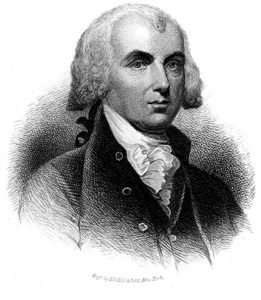James Madison’s Warning Against Federal Meddling in Local Schools

James Madison
According to the father of the Constitution, the powers delegated to the central government “are few and defined and those that remain in the States are numerous and indefinite.” ~ Federalist Papers #45
Madison also explained that those powers are “reserved to external objects” of “war, peace, negotiation, and foreign commerce.” He also stated that the central government’s power to tax is intended to be limited to those powers. Fed #45
Madison clarified the meaning of the often-abused “clauses” in 1792 during the Cod Fishery Bill debate. Specifically, that the General Welfare, Necessary and Proper, Commerce, and Tax and Spend clauses were not powers of their own but descriptions of the purposes of those limited and enumerated powers already mentioned.
The General Welfare clause, he explains, was added to describe the purpose of the limited powers being delegated to the central government, i.e., so the central government could use those powers for the “general welfare” of the union, rather than for the benefit of one State over the other. The debates make it crystal clear that this is not a blanket power to “do anything you can think of” to promote the so-called general welfare. It is, in fact, a limitation to direct that the power be wielded equitably.
In this debate, Madison also warns of the consequences of interpreting this clause as a general boilerplate power, rather than a description of the intent that the limited powers be to the general benefit of the entire union. He said, ”for if the clause in question really authorizes Congress to do whatever they think fit, provided it be for the general welfare, of which they are to judge, and money can be applied to it, Congress must have power to create and support a judiciary establishment, with a jurisdiction extending to all cases favorable, in their opinion, to the general welfare, in the same manner as they have power to pass laws, and apply money providing in any other way for the general welfare… If Congress can employ money indefinitely to the general welfare, and are the sole and supreme judges of the general welfare, they may take the care of religion into their Own hands; they may appoint teachers in every state, county, and parish, and pay them out of their public treasury; they may take into their own hands the education of children, establishing in like manner schools throughout the Union; they may assume the provision for the poor; they may undertake the regulation of all roads other than post-roads; in short, every thing, from the highest object of state legislation down to the most minute object of police, would be thrown under the power of Congress; for every object I have mentioned would admit of the application of money, and might be called, if Congress pleased, provisions for the general welfare.” James Madison, On The Cod Fishery Bill, Granting Bounties, 1792
It is relevant to note in this discussion that Madison is remarking that it is an obvious abuse of power for the central government to assume the role of education. He is speaking to his colleagues in extremes to show his point that interpreting the clauses in this way would result in an unlimited central government, a notion that would be highly offensive to the men involved in this debate.
Therefore, it is clear that the General Welfare clause does not give power or permission for federal involvement in school and much less for the Federal Department of Education. And to the contrary, according to “the Father of the Constitution,” once we have adopted this erroneous interpretation and application of the General Welfare clause and perhaps see federal involvement in our schools, we will know we have a ridiculously out of control federal government.
As Madison himself said it, ” I venture to declare it as my opinion, that, were the power of Congress to be established in the latitude contended for, it would subvert the very foundations, and transmute the very nature of the limited government established by the people of America; and what inferences might be drawn, or what consequences ensue, from such a step, it is incumbent on us all to consider.”
Because we have turned Constitutional interpretation over to our own musings that we have indeed “transmuted” into something other than a representative republic. In our arrogance, we have decided that the wisdom sown into our founding documents and expressed in the profuse writings of its framers does not need to be consulted. The fact is that this wisdom, as you know, is tied to over 700 years of lessons in history and 5 foundational Liberty Charters, not to mention the liberty philosophers and writers that our founders diligently consulted.
The question is this: Where is such negligence leading us? What kind of government are we creating? Into what are we transmuting?
Written by Kris Anne Hall for and published by Freedom Outpost ~ August 1, 2016.
FAIR USE NOTICE: This site contains copyrighted material the use of which has not always been specifically authorized by the copyright owner. We are making such material available in our efforts to advance understanding of environmental, political, human rights, economic, democracy, scientific, and social justice issues, etc. We believe this constitutes a ‘fair use’ of any such copyrighted material as provided for in section 107 of the US Copyright Law. In accordance with Title 17 U. S. C. Section 107, the material on this site is distributed without profit to those who have expressed a prior interest in receiving the included information for research and educational purposes. For more information go to: http://www.law.cornell.edu/uscode/17/107.shtml
